This is the website of Abulsme Noibatno Itramne (also known as Sam Minter).
Posts here are rare these days. For current stuff, follow me on Mastodon
|
I’ve fallen way too far behind on my little summaries of things I have read, so I’m switching methodologies. Instead of posting something for each book, I’ll do annual summaries. The last individual book I did was Envisioning Information which I read in February 2011, so I’ll start with 2011. I’ll do the whole year, even though it means backtracking a little bit.
Here goes, the books I finished in 2011:
- Nurtureshock by Bronson and Merryman [2009]: 2010-12-22 to 2011-01-03 (336p/13d=25.8p/d): A book about child development and parenting concentrating on places where research has shown results that are perhaps a bit counterintuitive. It was interesting.
- Shadow of the Giant by Orson Scott Card [2005]: 2011-01-03 to 2011-01-12 (6136L/10d=613L/d): The 9th book in the Ender series. One of the Bean ones. Continues the decline in the series. Still an entertaining read, but still a series that kept going past where it needed to.
- Fatal System Error by Joseph Menn [2010]: 2011-01-12 to 2011-01-18 (4589L/7d=656L/d): An investigation into internet organized crime. It followed investigations into a few rings of people responsible for DDOS attacks, cyber gambling, cyberwarfare. Interesting, and kinda scary.
- A War of Gifts by Orson Scott Card [2007]: 2011-01-18 to 2011-01-19 (1294L/2d=647L/d): the 10th book in the Ender series. More of a novella than a full novel. Very short. With a Christmas theme. Going back to Ender’s time in battle school. A rather odd addition to the series.
- All the President’s Men by Woodward and Bernstein [1974]: 2011-01-19 to 2011-02-05 (5862L/18d=325L/d): The classic recounting of the Watergate investigation. I found it interesting but a bit dry. I also found myself wishing it continued further in the story than it did.
- Ender in Exile by Orson Scott Card [2008]: 2011-02-05 to 2011-02-13 (380p/9d=42.2p/d): Book #11 of the Ender series. There are 15 now, with a 16th on the way, but this is the last of this series that I have read. This fills in a few gaps in Ender’s history. It was OK, but nothing special.
- Envisioning Information by Edward Tufte [1990]: 2011-02-13 to 2011-02-16 (126p/4d=31.5p/d): The second in Tufte’s series of books on similar topics. These are nice pretty books, but I think they are a bit overrated, and most of the points he makes were already made well in the first book. This is the last book I reviewed the old way.
- How to Live Safely in a Science Fictional Universe by Charles Yu [2010]: 2011-02-16 to 2011-02-21 (2877L/6d=480L/d): A bizarre little time travel story. Very impressionistic and dreamy. Everything seemed kind of foggy. It was never quite entirely clear what was happening. Or maybe I was just too dense to understand it. Anyway, not my kind of book at all. Can’t say that I liked it.
- Decision Points by George W. Bush [2010]: 2011-02-21 to 2011-04-09 (10840L/48d=226L/d): The second George Bush’s memoirs. Not really an autobiography, but just highlights of important “decision points” in his life. I actually liked it quite a bit. It humanized GWB quite a bit for me, and actually made me feel sorry for him. Although I know it was not his goal, but to me it left an impression of someone in over his head and swept away by events beyond his control.
- The Lion, the Witch and the Wardrobe by C. S. Lewis [1950]: 2011-04-09 to 2011-04-12 (1986L/4d=497L/d): The first (by original publication date) of the Narnia series. I think the last time I read this I was between 5th and 6th grade. It is VERY SHORT. A cute book though, despite the fact that the whole thing is just a thinly disguised religious allegory.
- Visual Explanations by Edward Tufte [1997]: 2011-04-12 to 2011-05-01 (156p/20d=7.80p/d): More of the same from Tufte. Once again full of nice visual artifacts. Once again makes a few good points. Once again makes some others I don’t buy so much.
- O by Anonymous [2011]: 2011-05-01 to 2011-05-27 (5881L/27d=218L/d): A novel based around a staffer on the campaign staff of a fictionalized Obama clone. It was perhaps intended to provide a little insight into what was going on in the campaign with a little added drama. But in the end it was mostly forgettable.
- The Cult of the Presidency by Gene Healy [2008]: 2011-05-27 to 2011-06-28 (4882L/33d=148L/d): An examination of the growth of executive power over the history of the United States, with a concentration on the 20th century. For those of us with a deep suspicion of concentration of power… any concentration of power… it is a disturbing history. But most importantly it shows the ratcheting nature of such things. Powers once taken are rarely ceded again without a major crisis. Especially relevant in post-9/11 America.
- Dying of the Light by George R. R. Martin [1977]: 2011-06-28 to 2011-07-13 (6591L/16d=412L/d): Martin’s first novel, long before the days of Game of Thrones. It is about the last few groups of people on a dying planet. I haven’t read any of the later series, but if this first effort is a taste of what is to come later, I understand what people got excited about. This was a good old fashioned fun Scifi romp. I enjoyed it and look forward to reading more by Martin.
- How to Measure Anything by Douglas W. Hubbard [2010]: 2011-07-13 to 2011-08-09 (6328L/28d=226L/d): This is a book about how to use various techniques to produce reasonable quantitative estimates of almost anything, including modeling the uncertainty in those estimates. Indeed, it makes the strong point that any estimate without a confidence interval is worse than useless. I found much of what this book had to say immediately useful, and put much of it into practice in things I did both at work and at home. Highly recommended.
- The Girl Who Circumnavigated Fairyland in a Ship of Her Own Making by Catherynne M. Valente [2011]: 2011-08-09 to 2011-09-01 (4273L/25d=171L/d): Structured like a more modern day Alice in Wonderland, this is also a story of a young girl traveling through a bizarre fairyland with strange rules for how things work. It was interesting, and had some cute bits, but it was perhaps a bit TOO whimsical and non-sensical for my tastes. Just not my cup of tea, although I can see why some would like it.
- The Origin of Species by Charles Darwin [1859]: 2011-09-01 to 2011-10-31 (9403L/61d=154L/d): I don’t know what possessed me to read this. Historical curiosity I guess. It is a tour de force of classical science and all. It is also extremely dry and slow moving. Not exactly a compelling page turner. And of course in most circles, no longer controversial or radical. Subsequent science has of course refined details and corrected bits and pieces, but the fundamental concepts survive basically intact. It was good to read it, but there are much more accessible modern overviews of evolutionary theory out there for those who want it.
And that was it for 2011. The book I started on October 31st wasn’t finished before the end of the year.
When I did the individual reviews, I had also been including charts for how many of the last 20 books I reviewed were available on Kindle, and how many of the last 20 books I have read I have read on Kindle. Using this new model, obviously the first is no longer really viable, so even though that ratio hadn’t yet reached the 90% at which I’d said I would stop, I will stop anyway.
I can still do the chart of what percentage of the last 20 books read have been read on Kindle. As of today (so including books finished not just in 2011, but also 2012, 2013 and so far in 2014) and starting from the day I first got a Kindle, it looks like this:
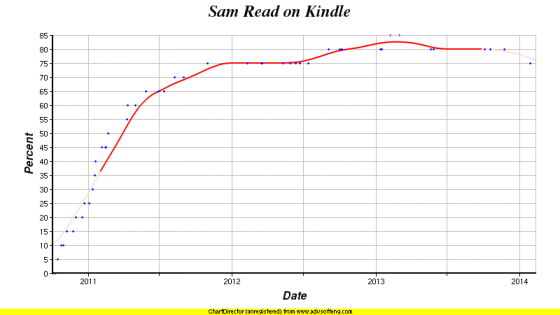
As you can see, this percentage peaked at 85% in early 2013 and has actually declined back down to 75% at the moment. 5 of the last 20 books I have read have been physical books. I find at this point that when I hit a physical book my reading slows down considerably, just because of the extra burden of having to carry the thing around. I am sure this percentage will go back up again, but as long as I keep occasionally reading physical books that have been gifted to me (or I occasionally choose a physical book I have owned for years) it will be hard for this to get up to 100%. For that to happen I would need to not just avoid buying new physical books (I already do that) but actually reject the possibility of physical books when they do come up. I’m not quite ready to do that.
In the future, I may separate out these Kindle Ratio graphs from any reviews I do. Or I may not post any more updates of the graph. Depends what I feel like later. :-)
Not sure when I’ll do the 2012 books. Someday.
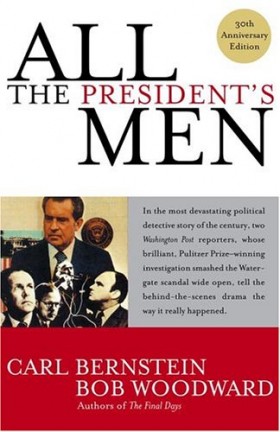 Author: Carl Bernstein and Bob Woodward Author: Carl Bernstein and Bob Woodward
Original Publication: 1974
Started: 2011 Jan 19
Finished: 2011 Feb 5
Format: Kindle
5862 locations / 18 days
326 locations/day
Once again writing these years after reading the book. Perhaps I’ll catch up someday. Ha!
Well, in any case, this is the classic Woodward and Bernstein narrative of their watergate investigations. More than two years later, my main memory of this is being disappointed that it ended before the resignation, so didn’t take the story the whole way. Yes, I know they did another book that covered the last days of the Nixon presidency, but I still wished this just continued.
I have a vague memory of thinking that while the events themselves were interesting and of course are historically important, than the actual tone of the writing was a bit dry and “this happened, then this happened, then this happened” for my taste. But it has been a long time since I read it, so who knows.
I’ve been toying with giving a star rating or some such when I do these things, but realize I actually have a better measure of how much I enjoy a book, and it is already listed above. When I am really into a book, I make time to read. I read in the spare moments during the day. A minute here or there whenever I catch a chance, and I end up choosing to read instead of watching TV or even instead of sleeping sometimes. I end up reading it faster. Not in terms of how fast I actually read while I’m sitting with the book, but in terms of how much I read per day. Meanwhile, for books I am NOT enjoying, I end up forcing myself to read a little every once in awhile, but don’t actually seek out time to read, so those go much more slowly.
Of course, this is also effected by how much free time I have. Although there are exceptions, in recent years this has been relatively steady, so I’ll just ignore it at the moment. :-)
And yes, this is also somewhat determined by the “difficulty” of the reading. A light fiction book is going to “flow” better than a dense textbook. But I think that also matches up with my enjoyment. The dense textbook may well provide me with valuable information, but I’m not sure “enjoy” would be the right word to describe my interaction with it.
With physical books, if you look at pages, that is of course a measure that depends on the size of the pages, the size of the print, if there are photos or illustrations, etc, etc, etc. But if I’m reading on a Kindle, most of that is abstracted out by the “location”. And look there above, I already have locations per day. With my patterns of reading (one book at a time, always finish any book I start), this is a good measure, at least for books I read on Kindle.
So, for All the President’s Men, I give an enjoyment score of:
326
As context, here is where this fits with the last 10 books I’ve reviewed (in order by score):
- 723 – Shadow of the Hegemon (F)
- 695 – Shadow Puppets (F)
- 656 – Fatal System Error (NF)
- 647 – War of Gifts (F)
- 614 – Shadow of the Giant (F)
- 446 – First Meetings (F)
- 326 – All the President’s Men (NF)
- NA – Nurtureshock (NF) [Physical 25.8 p/d]
- NA – 9 Ways to Bring Out the Best in You and Your Child [Physical 14.9 p/d]
- NA – Agile Project Management with Scrum (NF) [Physical 9.06 p/d]
So yeah, I guess I wasn’t all that excited by it compared to the last few things I’d read previously.
Finally, my usual two Kindle adoption graphs…
% of the last 20 books I reviewed that are now available on Kindle:
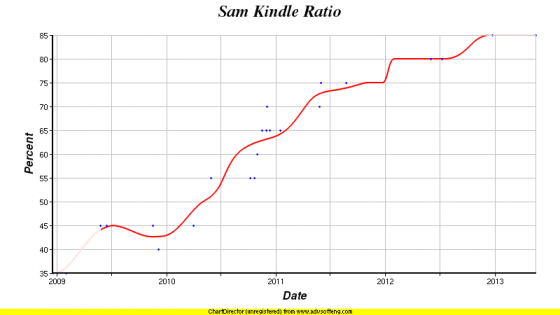
% of the last 20 books I read that I actually read on Kindle:
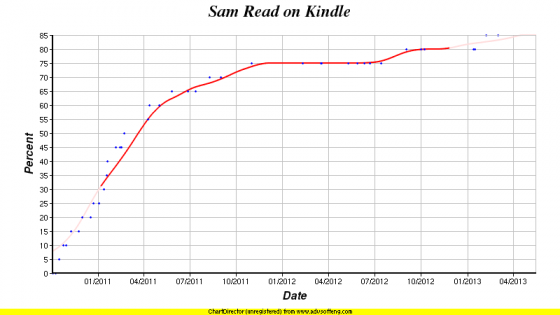
(I bought my Kindle when the first ratio hit 50%. I’ve said before that I’ll do these charts until the ratios get to 90% or so.)
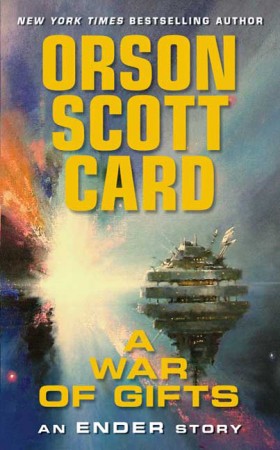 Author: Orson Scott Card Author: Orson Scott Card
Original Publication: 2007
Started: 2011 Jan 18
Finished: 2011 Jan 19
Format: Kindle
1294 locations / 2 days
647 locations/day
I continue my tradition of writing “quick” reviews of books over a year after I read them… uh, almost two years after I read them. Oops. Anyway, I guess this has value as it leaves in my head only what is fundamentally memorable about a book, not just the initial impressions.
So on Orson Scott Card’s War of Gifts, basically my memory at first blush was really weak:
- It is yet another in the Ender series. #10 in publication order.
- It is not a full novel. Maybe a novella? Really not much more than a short story.
- It has a Christmas theme.
That is about all that persisted in my memory all this time, so I reviewed the Wikipedia page to refresh my memory.
It really is an oddball little Christmas story that doesn’t fit in all that well with the rest of the series. It is like when your favorite hard rocking band comes out with a Christmas album. Some kind of effect. You end up thinking “Uh, OK. But what??”
In the end it wasn’t a bad little short story. It just seemed out of place.
The five second plot summary is that a student who is fairly religious arrives at battle school, where overt religious expression is forbidden as divisive. Hijinks then ensure over the Chirstmas season as various groups try to express their religious beliefs in various ways. Finally, Ender comes in and plays diplomat and resolves the situation.
The end.
If you are trying to be a completist and read all the Ender books, by all means this needs to be part of that. Otherwise though, I’d probably skip this.
OK, as has been my pattern, with each review, a couple of graphs regarding Kindle coverage:
% of the last 20 books I reviewed that are now available on Kindle:
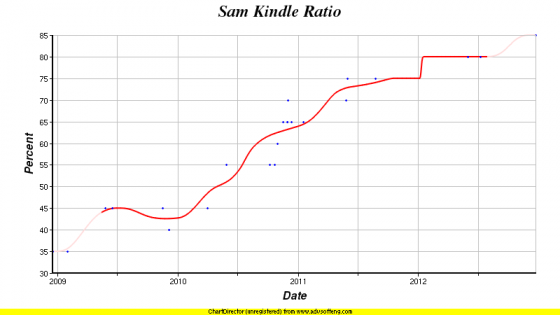
% of the last 20 books I read that I actually read on Kindle:
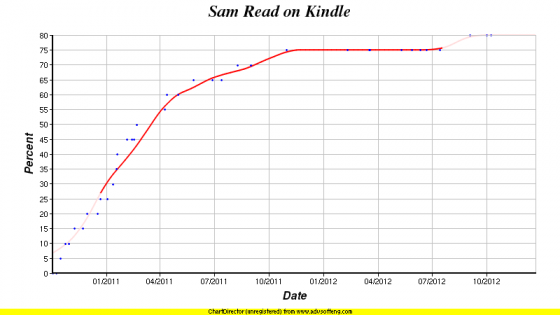
(I bought my Kindle when the first ratio hit 50%. I’ve said before that I’ll do these charts until the ratios get to 90% or so.)
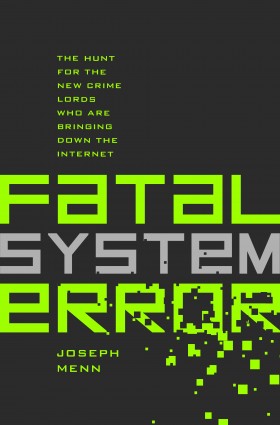 Author: Joseph Menn Author: Joseph Menn
Original Publication: 2010 Oct 26
Started: 2011 Jan 12
Finished: 2011 Jan 18
Format: Kindle
4589 locations / 7 days
656 locations/day
So yeah, yeah, first I’ll just get it out of the way. I am writing this review over a year and a half after I read the book. Oops. Oh well. That’s just the way it is sometimes. Way behind. You know what that’s like.
Anyway, this is a book that looks at some aspects of internet crime, specifically spending a lot of time on DDOS attacks, defending against them, and some messy battles involving internet gambling sites, but also expanding to include some thoughts on “cyberwarfare” between governments and some on identity theft.
I remember the biggest impression I left the book with at the time was basically “Wow, really, there are REAL criminals and bad guys doing this kind of stuff?” I have to admit, that while I was vaguely aware of that fact, my overall impression of this sort of thing was that it was a bunch of small time folks, doing annoying stuff from their home computers. Not really the “organized crime” sort of picture that this book paints.
Of course that makes perfect sense though. If there is money to be made by scamming people or whatnot, and it can be more easily done via the internet, sure, there may be small timers out there, but why the hell wouldn’t it get organized and big? And since we’re talking about illegal and unethical acts for the most part, obviously that is going to take on the flavor of organized crime, and all of the sorts of things that implies in terms of violence and threats of violence getting added to the mix.
The book itself was an interesting detective story following the process of tracking down some of these crimes and tracking down who was actually doing what, and in some cases trying to actually move toward prosecutions and arrests, including dealing with corruption in Russia and other obstacles.
It was a good read. I don’t have the expertise to really understand how representative the types of stories outlined here really are, but it was interesting and disturbing. Worth the read if you are curious about this sort of thing.
Finally, in the past I’ve separately done posts with charts on what portions of my recent reviewed books were available on Kindle, and what portion of my recently read books were actually read on Kindle. Going forward I will just include that at the end of my review posts. So here goes.
% of the last 20 books I reviewed that are now available on Kindle:
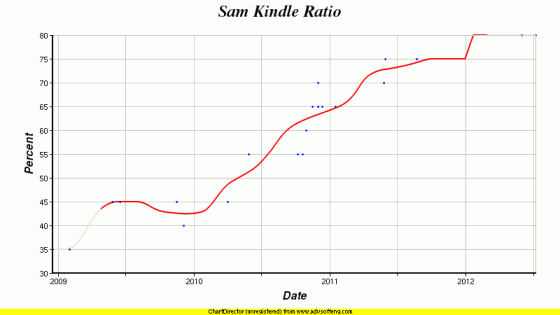
% of the last 20 books I read that I actually read on Kindle:
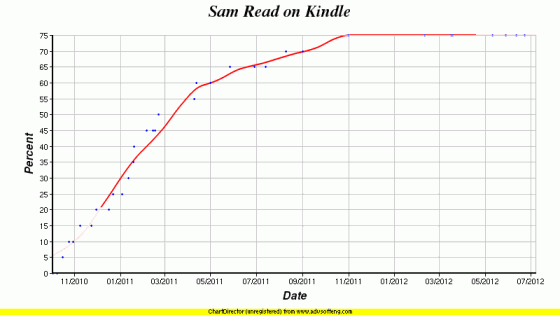
(I bought my Kindle when the first ratio hit 50%. I’ve said before that I’ll do these charts until the ratios get to 90% or so.)
OK, in the past I’ve just done the percentage of the last 20 Books I’ve read that are available on Kindle. Of course, I have really done these calculations after I post the reviews of the books, not right after I’ve read them, and right now, I’m way behind. At this point there are 13 books I’ve finished reading that I haven’t yet posted my thoughts on. Oops. Also, this has been all about what percentage of the books were available on Kindle. Now that I actually have one, another relevant stat is how many I’ve actually read on the Kindle. So, two charts…
First, percentage of the last 20 books I have REVIEWED that are currently AVAILABLE on Kindle (so this doesn’t include the 13 books I have read but haven’t yet reviewed) – This is now at 70%.
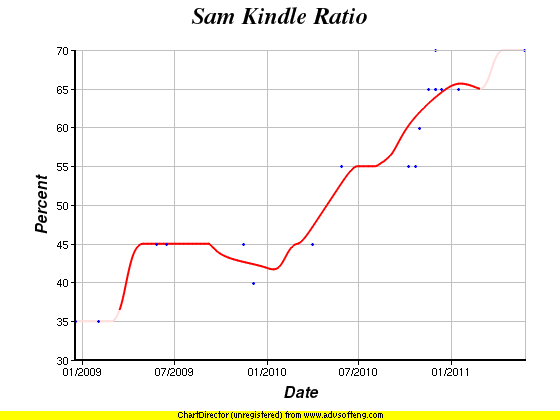
Next, the percentage of the last 20 books I have READ that I actually READ on the Kindle (this does include the 13 books I have read but have not yet reviewed) – This is now at 65%.
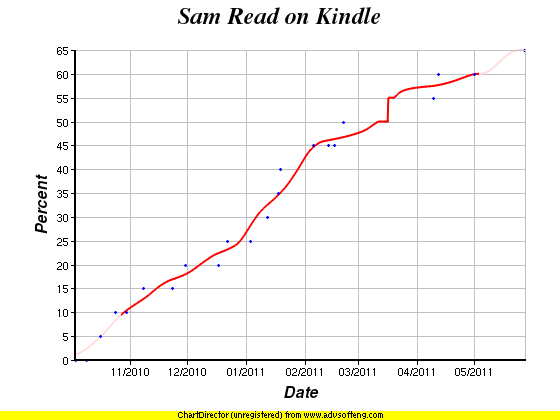
By the way, I think I’ll discontinue posting about these charts when/if each hits 90%.
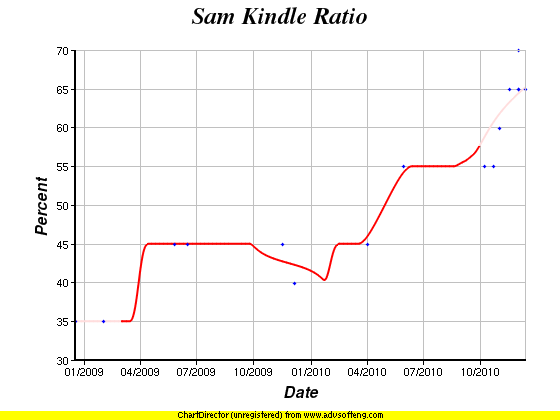
So, the latest update. The newest book of the last 20 I read was not available on Kindle, while the one that fell off had been, so the ratio falls from 70% to 65%, with 13 of the last 20 available on Kindle. For reference:
1 – NO – 9 Ways to Bring Out the Best in You and Your Child
2 – YES – Shadow of the Hegemon
3 – NO – The Visual Display of Quantitative Information
4 – YES – Ender’s Shadow
5 – YES – The Elegant Universe
6 – YES – Children of the Mind
7 – NO – Introduction to Algorithms
8 – YES – Xenocide
9 – YES – The Geography of Bliss
10 – YES – Speaker for the Dead
11 – NO – First Break all the Rules
12 – YES – Ender’s Game
13 – YES – Until the Sea Shall Free Them
14 – YES – Foucault’s Pendulum
15 – YES – Java The Complete Reference
16 – NO – Harry Potter and the Deathly Hallows
17 – YES – The Audacity of Hope
18 – NO – Harry Potter and the Half-Blood Prince
19 – NO – Data Mining
20 – YES – The Children of Hurin
And there we are for the moment.
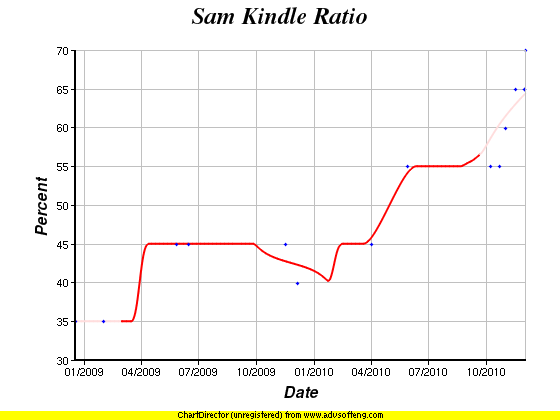
Yet another update of the percentage of the last 20 books I have read which are available on Kindle as of right after I wrote the post about Shadow of the Hegemon. That book was available on Kindle, the one that fell off the 20 was not, and none of the ones in between changed status, so the percentage goes up from 65% to 70%. For reference:
- YES – Shadow of the Hegemon
- NO – The Visual Display of Quantitative Information
- YES – Ender’s Shadow
- YES – The Elegant Universe
- YES – Children of the Mind
- NO – Introduction to Algorithms
- YES – Xenocide
- YES – The Geography of Bliss
- YES – Speaker for the Dead
- NO – First Break all the Rules
- YES – Ender’s Game
- YES – Until the Sea Shall Free Them
- YES – Foucoult’s Pendulum
- YES – Java The Complete Reference
- NO – Harry Potter and the Deathly Hallows
- YES – The Audacity of Hope
- NO – Harry Potter and the Half-Blood Prince
- NO – Data Mining
- YES – The Children of Hurin
- YES – Dreams from my Father
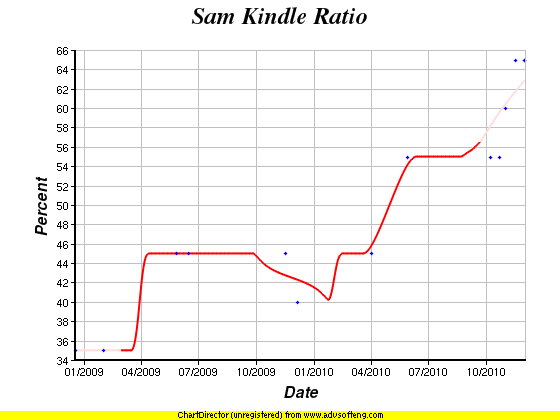
So, yet another update of the percentage of the last 20 books I’ve read that are available on Kindle as of soon after I posted about The Visual Display of Quantitative Information. The book that fell off was not available, neither was the one I just added, and none of the ones in between changed status, so the metric stayed at 65%.
- NO – The Visual Display of Quantitative Information
- YES – Ender’s Shadow
- YES – The Elegant Universe
- YES – Children of the Mind
- NO – Introduction to Algorithms
- YES – Xenocide
- YES – The Geography of Bliss
- YES – Speaker for the Dead
- NO – First Break all the Rules
- YES – Ender’s Game
- YES – Until the Sea Shall Free Them
- YES – Foucoult’s Pendulum
- YES – Java The Complete Reference
- NO – Harry Potter and the Deathly Hallows
- YES – The Audacity of Hope
- NO – Harry Potter and the Half-Blood Prince
- NO – Data Mining
- YES – The Children of Hurin
- YES – Dreams from my Father
- NO – The Odyssey
I’ll note as I have the last few times that other editions of The Odyssey are available on Kindle, just not the specific edition I read.
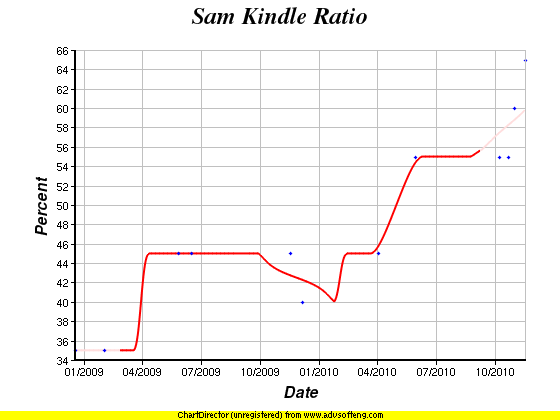
So, here we are with the Kindle Ratio (what proportion of the last 20 books I’ve read are available on Kindle) as of right after my post about Ender’s Shadow. The percentage goes up a bit because this last book was available, where as the one that dropped off was not. As mentioned, this metric is now biased by the fact that the way I pick books now prefers Kindle books. For those interested, the 20 books this was based on were:
- YES – Ender’s Shadow
- YES – The Elegant Universe
- YES – Children of the Mind
- NO – Introduction to Algorithms
- YES – Xenocide
- YES – The Geography of Bliss
- YES – Speaker for the Dead
- NO – First Break all the Rules
- YES – Ender’s Game
- YES – Until the Sea Shall Free Them
- YES – Foucoult’s Pendulum
- YES – Java The Complete Reference
- NO – Harry Potter and the Deathly Hallows
- YES – The Audacity of Hope
- NO – Harry Potter and the Half-Blood Prince
- NO – Data Mining
- YES – The Children of Hurin
- YES – Dreams from my Father
- NO – The Odyssey
- NO – Rise and Fall of the Confederate Government (Vol II)
I’ll note as I have the last few times that other editions of The Odyssey and the Rise and Fall of the Confederate Government (Vol II) are available on Kindle, just not the specific editions I read.
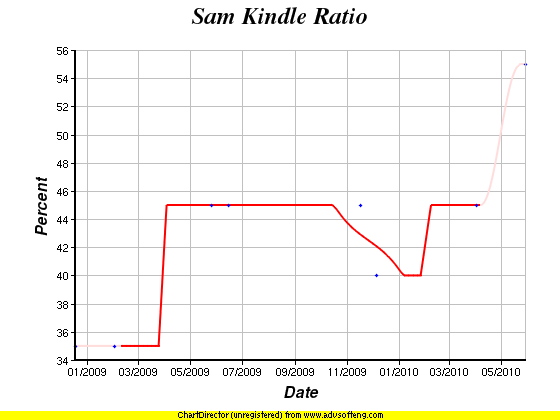
As I have since December 2008, after I finish each book I read I’ve been calculating what percentage of the last 20 books I have read are available on Kindle. I’ve been doing this because I have said all along that once that ratio was greater than 50% I would “Officially want a Kindle”. Well, it seems that since the last time I looked at this in April, several of the 20 books in question that were not available on Kindle have become available. As of today we are at 55%. In other words, 11 out of the last 20 books I read are now available on Kindle. So it is time. I “officially want a Kindle”.
This does not however mean I will order one today. I am in the middle of a physical book right now, and the next book in line I also already have a physical copy of. And there are other items ahead of a Kindle in the spending priority list. But as of now, I do want one. :-)
I have also decided on the algorithm I will use to determine what to read next whenever I finish a book once I have a Kindle as well. But I will wait until I actually have one before describing it I guess, in case I change my mind. :-)
I will continue reporting this ratio until I actually have a Kindle and read the first book on it. After that I will stop.
|
|
















